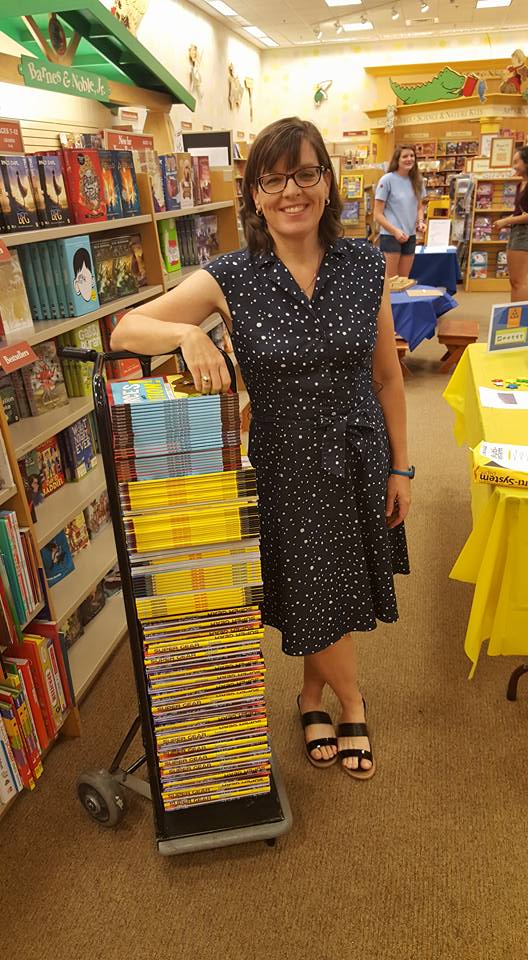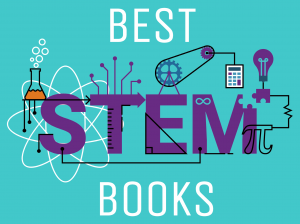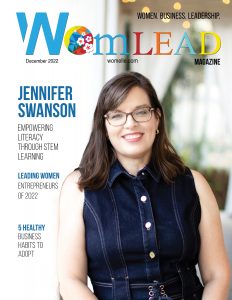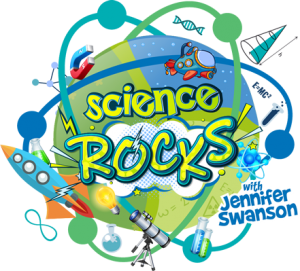
Jennifer began her writing career at the age of five when she wrote and illustrated books for her kindergarten class. A self-professed science geek, Jennifer has always been captivated by the world around her and is curious to understand how it works. As a young child she used to gather leaves and flowers and look at them under a microscope, wade through her backyard creek, and tromp through woods. She has carried that love of science her whole life.
Jennifer has a B.S. in chemistry from the U. S. Naval Academy and an M.S. Ed in K-8 science from Walden University. In addition to being an award-winning author, she was a middle school science instructor for John Hopkins University’s Center for Talented Youth for almost 15 years.
Now, Jennifer Swanson is the award winning author of over 45+ nonfiction books for children, mostly about science and technology. Jennifer’s passion for science and technology resonates in all her books but especially, BRAIN GAMES (NGKids) and SUPER GEAR: Nanotechnology and Sports Team Up (Charlesbridge), Astronaut-Aquanaut, and Parents’ Choice Gold Award Winner, Save the Crash-test Dummies and her 2021 Kirkus Best Nature book, Outdoor School: Rocks, Fossils, and Shells. Her books have received many accolades including the starred reviews, Booklist Best Tech books list, Green Earth Book Honor Award, two Florida Book Awards, and multiple California Reading Association awards, and National Science Teaching BEST STEM awards. her BRAIN GAMES book was even #13 on the The Planets.org 50 Best Science books Ever Written.
An accomplished and exciting speaker, Jennifer has presented at National NSTA conferences, the Highlights Foundation, the Atlanta Science Festival, the World Science Festival in NYC, the Smithsonian’s Udvar-Hazy Center, and the Library of Congress’ National Book Festival. Jennifer encourages kids (of all ages) to engage their curiosity and DISCOVER the Science all around them!
Jennifer was featured in the WomLEAD magazine for her work as the Founder/CEO of KidLiteracy, her nonprofit organization dedicated to improving STEM Literacy through the process of IMAGINE. EXPLORE. READ. Find more information HERE
Book Reviews
This colorful book is full of cool optical illusions, memory tests, and pattern finding challenges paired with clear and energetic explanations of the neuroscience behind them. Swanson’s Brain Games is a fun and informative read that will propel kids to explore their own brain power.
Mary Kay Carson, author of five books in the Scientists in the Field series published by Houghton Mifflin Harcourt.
This vibrantly–illustrated book on hybrid cars, one of a series of 13 on "How Things Work," is very informative, with a relevant message for our society. The author (a middle school science teacher) explains greenhouse gases and global warming at an appropriate level, then connects the information to the importance of hybrid cars.
The book begins with a child and parent leaving for soccer practice. The mom must first check the battery and the hydrogen level of the car before they leave their home. The remainder of the book is divided into interesting fact–filled sections. There is a labeled diagram of a hybrid car in the text as well as a page listing the benefits of a hybrid car. An entire section which details how a hybrid car works will be very helpful to students and teachers. There is also a list of the four most popular hybrid cars on the market.
The book is not text–heavy so it will be an easy and quick read for students. There are great nonfiction features in the book, such as a wonderful timeline which begins in 1769 with the first steam–powered carriage built in France, and ends in 2011 with more than forty hybrid cars around the world. A neatly illustrated comic book style “Table of Contents”, index, glossary, and “Find Out More” section complete the book. Teachers can use the book as a supplement to a unit, librarians could use the book as a read–aloud on Earth Day, and students would find the book useful for a science report on hybrid cars.
Tracy Alley, National Science Teachers Association
Body Bugs: Invisible Creatures Lurking Inside You
The "Introduction," noting that "your body is home to more than 90 trillion microbes" will grab the attention of lovers of everything gross. Besides bacteria, mites also live on human skin, and while most are harmless, some are parasites. Viruses love nose hair, most of which the body can fight off. Another location for microbes is in teeth, but brushing will get rid of most of them. Some microbes, such as probiotics in the intestines, are helpful but others inhabiting the intestine such as E. coli, which comes from undercooked food or contaminated water, can cause severe illness. Having started with the head, Swanson finishes with feet with foot fungus and 250,000 sweat glands attracting the smelly bacteria that dine off sweat. Again, a glossary, bibliography/webliography, and index end the book.
Astronaut/Aquanaut is a challenging book to read. There is a great deal of information packed into each page. Yet it is compelling. I believe that there are plenty of intelligent, ambitious kids out there who dream of exploration and will savor every word of this book.
Ms Swanson is one of THE best speakers we have ever hosted. Her content (Astronauts) was the perfect tie in to our Right to Read Week. The manner in which she actively engaged our LARGE student population was amazing. As a principal, I have booked many speakers for our students who are very knowledgeable about their content; but can not command the attention of 200 1st graders for 45 minutes. Ms Swanson has both of those abilities. She spoke to our entire student body, 1200 students, in groups of 200 and was able to touch on areas with each group that was relevant to their science curriculum. You would be remiss if you did not consider having Jennifer Swanson participate in your event.
Combining the popular subjects of environmentalism and new technology, hybrid cars make for an ideal topic for middle-grade readers. This volume in the How Things Work series is bouncy, savvy, and, above all, clear; it is hard to come away without a working knowledge of everything from the mechanics of hybrid engines to why dependence on foreign oil is bad. Hosting the series are two cartoons - a robot and a caveman - especially apt choices for a book couched in the concept of discarding old energy sources for new. (When the caveman plugs his PHEV car into one of the robot's sockets, the robot deadpans, "This is humiliating.") A four-page time line explains the history of the concept, while bright cutaway illustrations show how the hybrid saves gas and how a fuel cell converts hydrogen gas. But the main event is Swanson's gift for making complicated subjects crystalline. To explain greenhouse gases, she compares them to the heat that builds up inside a parked car because of the glass windows - a swift, germane metaphor. The back matter is a bit skimpy, but otherwise this is a model of how to make science appeal to young readers.
**Booklist -- Starred Review **
Booklist - Daniel Kraus
GR 8 UP—As the world becomes increasingly more tech-based, students and consumers must learn how to operate efficiently and effectively within that framework. In order to help readers become well informed, this series discusses the benefits and drawbacks of several technological advances that are permeating education and industry today, as well as ones that teens may or may not already be using in their daily lives. The books are well structured and clearly written, but the text can be extremely detailed and dense. A background in technology isn't an absolute requirement, but these books are not for total Luddites: teens need to have some awareness of context and terms. (A glossary does help with this.)VERDICT Considering the rapid evolution of tech, educators may wonder how relevant this set will be in a few years, but readers will most likely take an interest in certain topics and can certainly benefit from learning more.
School Library Journal - Reviewed on APRIL 1, 2015 | Series Made Simple
2016 Best STEM Book Award by the National Science Teachers Association

Best STEM Books is a joint project of several organizations: the American Society for Engineering Education, the International Technology and Engineering Educators Association, the National Science Teachers Association, the Society of Elementary Presidential Awardees, and the Children’s Book Council (ASEE, ITEEA, NSTA, SEPA, and CBC). The list provides knowledgeable recommendations to educators, librarians, parents, and caregivers about the best trade
books with STEM content.
"I really enjoyed your book. It’s just so interesting to me and my whole family. I take your book
everywhere I go. I hope you come back to show us more." -- Jada
"I learned a lot. I had a blast, my first in school!! You taught me the skills I didn’t know and they
will be in my head forever." -- Kenyan
These titles are designed for casual browsers and more serious readers alike. The four chapters, introduction, and afterword offer a planned route through these ambitious overviews, while the mini-bites of information keep them friendly.VERDICT These resources present accessible fun; both will find eager audiences.
School Library Journal
Physics is fun with this colorful and informative book for students ages 7–10.Using the theme of motion, the book encourages readers to push, pull, spin, twist, and turn their way to learning basic concepts of force and motion. There are ample activities and projects throughout the book that provide the reader with ways to explore forces and motion and learn basic concepts while having loads of fun. Students will enjoy the fun graphics in the book. This book would be excellent as a textbook for young readers.
National Science Teacher Association (NSTA)
Colorfully illustrated by photos, this book introduces “the science of the very small” as applied to sports equipment and clothing… An up-to-date look at the intersection of technology and sports.
-- Booklist
Girls will say, "Eww, yuck!" and walk away. Boys will say, "Gross!" and read the series. From the enlarged microphotographs on the covers, the reader's eye is drawn to the topics. Helpful study tools include bolded words defined in a word box, and labeled microphotographs. All books discuss the harmfulness of uncontrolled microorganisms, but also tell about the useful role of the critters. Food Intruders adds historical information about Salem witchcraft and bad bread, the potato famine in Ireland, salmonella contamination, etc. Though most suited for upper elementary, the books would be valuable in middle school for struggling readers. Recommended.
Marion Mueller, Library Media Consultant, Rawhide Starr Academy
This reader-friendly introduction to nanotechnology breaks down the science and describes the processes of nano-manufacturing in a clear and understandable way. Packed with photographs, diagrams, and text boxes, this book will appeal to athletes and sports enthusiasts—and the curious.
-- ILA
I never imagined that reading about how the brain works could be such fun! Brain Games is an interactive and exciting reading experience. Readers learn as they play. Brain Games explores memory, emotion, decision-making, and physical action using real life examples and sound scientific facts. A fantastic resource for school or home.
Elizabeth Raum, author of over 100 children's nonfiction books, former library director of Concordia College (Moorehead, MN), and Teaching Artist with the North Dakota Council on the Arts.
Explore how your brain’s wet ware helps you create memories, experience emotions, make decisions, and control your body. Brain Games chapters begin with an intriguing Challenge to try, then explain what’s happening. The Challenges and the Brain Breaks games are fun for kids and adults! Vivid illustrations complement clear writing. Enjoy this lively read alone, in a classroom, or travelling.
This book is chock full of text and visual information about robotics. It will take readers days and many close re-readings to digest all the information provided about the history of robotics, the influences of robotics on facets of our lives, and how to get involved with robotics challenges.
-- ILA
Swanson is splendid at explaining how nanotechnology works, and boxed asides help readers conduct experiments on drag, surface area, and such.
-- Kirkus Reviews
This book brilliantly combines history, physics, and design. Each chapter focuses on a different aspect of car safety—bumpers, brakes, seatbelts, and so forth—and chronicles its design history, explaining early ideas and tracing how various approaches were either developed or abandoned. The result is both funny and compelling. Swanson treats each design idea with respect, considering the logic behind the ideas that readers might otherwise be inclined to laugh off (like the pedestrian net that would scoop unwary walkers to safety); in the process, she emphasizes the importance of learning from failure. Grooms’s illustrations and diagrams add both humor and clarity to the physics concepts. By using the framework of the work performed by crash-test dummies, Swanson and Grooms also smoothly highlight the importance of paying attention to gender, age, and size in experimental science. This excellent STEM book will appeal to a wide range of readers, whether or not they are already interested in engineering.
Naomi Lesley ©2020 Parents’ Choice
Each year 12,500 school children ages 5–12 from different regions of the United States read newly published children’s and young adults’ trade books and vote for the ones they like best. These Children’s Choices, selected from more than 900 titles, can be counted on as books children really enjoy reading.
A highly engaging introduction to an exciting aspect of cutting-edge, real-world science for STEM collections.
School Library Journal
Brainy books aren’t for everyone, but if you’re one of those who love everything “brain” including how your brain works, how it perceives and relays those perceptions to you, and how—in many ways—it works you like a puppet on a string, there’s a new picture book just for you. It is National Geographic Kids’ Brain Games: The Mind-Blowing Science of Your Amazing Brain, by Jennifer Swanson, and for lack of a better word . . . it’s amazing! See More
Rita Lorraine Hubbard, New York Journal of Books
At its greatest extent in the 13th and 14th centuries, the Mongol Empire stretched from northeastern Europe to northern China and the Pacific, and this well-written set covers its entire history, from founding to expansion and enormous influence to decline... The Mongol empire is an often overlooked part of history, and this set gives it the attention it deserves. VERDICT A first purchase for middle school and early high school students.
School Library Journal, November 2016
Selected as 1 of 12 Books to Jump-Start Your Summer by the International Literacy Association (May 2016)






